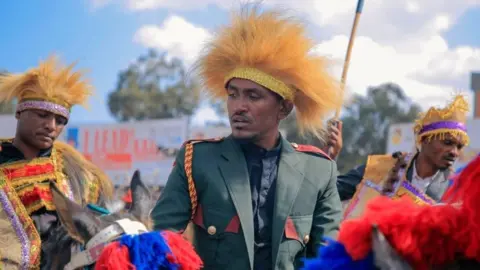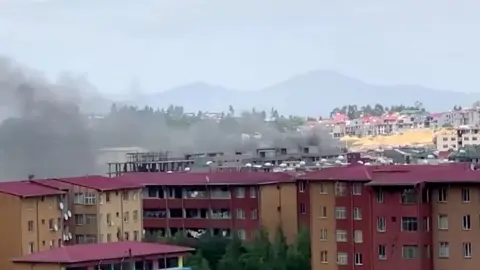Hachalu Hundessa - Ethiopia's murdered musician who sang for freedom
 Dagi Pictures
Dagi PicturesMore than 80 people have been killed in two days of unrest in Ethiopia following the killing of prominent singer Hachalu Hundessa.
The 34-year-old had emerged as a powerful political voice of the Oromo ethnic group, and had made many enemies during his musical career.
Two suspects were arrested after he was shot dead while driving in the capital, Addis Ababa on Monday evening. However, police have not yet revealed a motive for the killing and no charges have been brought against the suspects.
Hachalu's funeral has taken place in his hometown of Ambo.
BBC Afaan Oromoo's Bekele Atoma writes about the musician who was a thorn in the flesh of successive governments.


A former political prisoner who grew up looking after cattle, Hachalu rose to become one of Ethiopia's biggest music stars, mesmerising fans with his songs about romance and political freedom - topics that he easily blended into his lyrics.
Hachalu's father, who used to work in the electricity department in the city of Ambo, aspired for his son to become a doctor, but he showed little interest in medicine.
However, from an infant, Hachalu showed a passion for music and singing, with the encouragement of his mother, while he looked after cows on the family's farmland on the outskirts of Ambo in the Oromia region, the heartland of Ethiopia's largest ethnic group, the Oromo.
"I used to sing whatever came to my head," he recalled in a BBC Afaan Oromoo interview in 2017.
Jailed for five years
One of eight children, Hachalu was born in 1986 in Ambo - a city about 100km (60 miles) west of the capital, Addis Ababa.
It was at the forefront of the campaign by Oromos for self-rule in a nation where they felt repressed under a government that had banned opposition groups and jailed critics.


Hachalu went to school in Ambo, and joined student groups campaigning for freedom.
At the age of 17 in 2003, Hachalu was imprisoned for five years for his political activities.
His father kept his morale high in prison, telling him during visits that "prison makes a man stronger".
Hachalu became increasingly politicised in prison, as he increased his knowledge about Ethiopia's history, including its rule by emperors and autocrats.
I did not know how to write lyrics and melodies until I was put behind bars"

Whilst incarcerated in Ambo prison he also developed his music skills.
"I did not know how to write lyrics and melodies until I was put behind bars. It is there that I learned," he said in the 2017 interview.
During his time in jail, he wrote nine songs and released his first album Sanyii Mootii (Race of the King) in 2009, a year after walking free.
Refused to go into exile
The album turned him into a music star, and a political symbol of the Oromo people's aspirations.
However, he played down his political role, saying: "I am not a politician, I am an artist. Singing about what my people are going through doesn't make me a politician."
 AFP
AFPMany other musicians and activists fled into exile fearing persecution under the rule of then-Prime Minister Meles Zenawi and his successor Hailemariam Desalegn but Hachalu remained in Ethiopia and encouraged the youth to stand up for their rights.
One of his songs was about how he fell in love with a girl who was proud of her identity and was willing to die for it.
'Gallant warriors and horsemen'
His second album Waa'ee Keenya (Our Plight) was released in 2013 while he was on a tour in the US. It became the best-selling African album on Amazon at the time.
Two years later, he released a powerful single, Maalan Jira? (What existence is mine?), referring to the eviction of Oromos from Addis Ababa and its surrounding areas, after the government decided to expand the boundaries of the city.

For Hachalu, the 2015 displacements showed that history was repeating itself.
He shared the view of Oromo historians that what is currently known as Addis Ababa was once the home of the Tulama clans of the Oromo, and they were forced out by Emperor Menelik II.
In June, Hachalu angered the emperor's supporters after he accused Menelik II of stealing the horses of Oromos - who see themselves as gallant warriors and horsemen - when he established Addis Ababa as his seat of power, and Ethiopia's capital in 1886.
 Getty Images
Getty Images
Hachalu's songs became the anthem of the protest movement which emerged in 2015 to demand an end to the displacement of Oromos.
At a time of heightened protests at the end of 2017, Hachalu released another song.
"Do not wait for help to come from outside, a dream that doesn't come true. Rise, make your horse ready and fight, you are the one close to the palace," he sang, often to cheers from his fans.
'Singer was fearless'
The protests snowballed into a campaign for greater political freedom, culminating with Ahmed Abiy becoming the first Oromo to take the post of prime minister in 2018 with a promise to release all political prisoners, unban opposition groups and hold democratic elections.

Read more about Ethiopia:

Two months after Mr Abiy took office, Hachalu was invited by the government to perform at a concert held in honour of Eritrea's President Isaias Afeworki, who was visiting Ethiopia for the first time since the end of a border war between the two neighbouring states.
Hachalu proved to be as independent and fearless as ever, singing about the need to achieve justice for people who had been killed in conflict in eastern Ethiopia between the Oromo and Somali ethnic groups, and questioning how a concert could be held when families were grieving.
Government officials later criticised him for singing "inappropriate" songs for the occasion, but it increased his popularity.
Music is my life. It got me friends and foes"

Although he sang only in Afaan Oromoo, his songs - especially those which called for greater political freedom in Ethiopia - saw him build a fan base across all ethnic groups.
Hachalu lived in Addis Ababa, where he was shot dead on Monday evening.
While the motive for the killing is unclear, he often spoke of receiving death threats from people who disagreed with him politically.
"Music is my life. It got me friends and foes. But it remains a tool that I use to speak for my people, a tool that I use to express my deepest feelings," he said three years ago.
 Reuters
ReutersFollowing his death, his supporters took to the streets in several cities and towns to pay tribute to him, resulting in clashes with the security forces that left at least 80 people dead and the arrest of more than 30, including the prominent Oromo politician, Jawar Mohammed.
Carrying Oromia flags, some of his supporters chanted: "One day we will be free. Hachalu, the blood you shed won't be in vain."
He is survived by his wife of 10 years, Fantu Demissie, and their two daughters.
